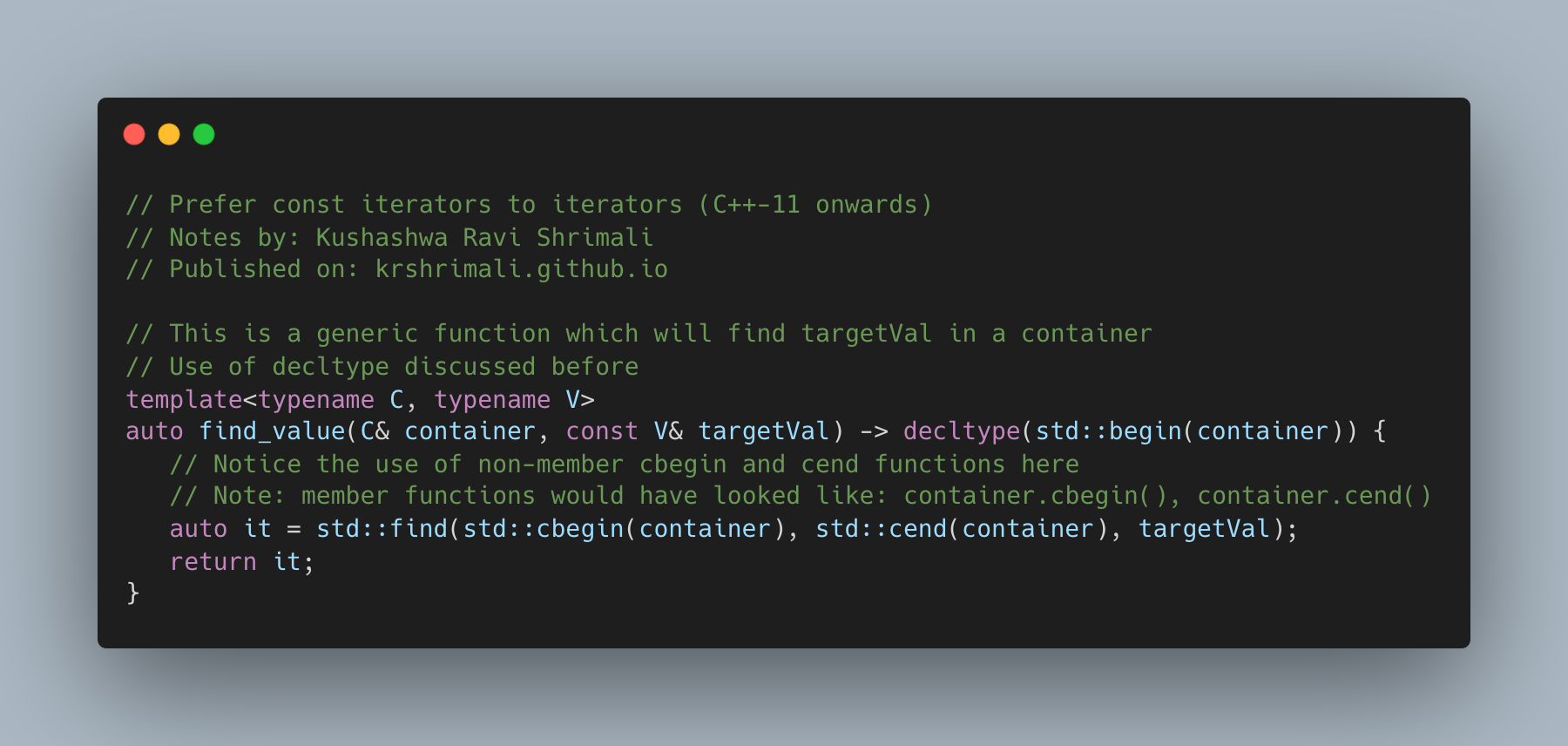NOTE
My notes on Chapter 3, Item 13 of Effective Modern C++ written by Scott Meyers.
Some (or even all) of the text can be similar to what you see in the book, as these are notes: I’ve tried not to be unnecessarily creative with my words. :)

In C++, iterators come handy to point at memory addresses of STL containers. For example,
// C++11
std::vector<int> x {11, 9, 23, 6};
// begin() member function returns an iterator, which points to the first
// memory address of the container x
std::vector<int>::iterator it = x.begin();
While the general practice is to use const whenever possible, but programmers tend to use whenever it’s practical. const_iterators is particularly suggested when you want to use iterators, but you don’t need to modify what it points to.
Take an example of the code snippet above, you have the iterator it pointing to the beginning position of the container, and if you want to insert a value before this, you just need to pass this iterator to x.insert() along with the value, right? You don’t need to modify the iterator. In such cases, const_iterator will be a better choice.
But, this is all for C++-11 and above. In C++-98, const_iterator wasn’t just ready:
// C++-98
// Without using const_iterator
// C++-98, initializing a vector wasn't that trivial as it is now
const int values[] = {11, 23, 6};
std::vector<int> x (values, values+3);
// Want to insert 9 before 23 here
std::vector<int>::iterator it = std::find(x.begin(), x.end(), 23);
x.insert(it, 9);
While this will work in C++-98, but since we don’t modify the iterator it, using const_iterators is a better choice:
// C++-98: this won't compile
// Not using aliases here, C++-98 didn't have the support for aliases
// (was introduced in C++-11)
// Using these typedefs makes it easier to reuse them
typedef std::vector<int>::iterator it;
typedef std::vector<int>::const_iterator c_it;
// C++-98, initializing a vector wasn't that trivial as it is now
const int values[] = {11, 23, 6};
std::vector<int> x (values, values+3);
c_it ci = std::find(static_cast<c_it>(x.begin()), static_cast<c_it>(x.end()), 23);
x.insert(static_cast<it>(ci), 9);
If you compile the code snippet above using C++-98 (if you are using g++, use: g++ <filename>.cpp -std=c++-98), you will hopefully get an error similar to:
main.cpp:10:14: error: no matching conversion for static_cast from 'c_it' (aka '__wrap_iter<const int *>') to 'it' (aka '__wrap_iter<int *>')
x.insert(static_cast<it>(ci), 9);
^~~~~~~~~~~~~~~~~~~
As you can probably notice, it says “no matching coversion for static_cast from c_it to it”, that means in C++-98 there was no straight forward way to cast const_iterator to iterator. The author does point that there are some reall non-trivial ways to get around, but those are out of the scope of this blog and the book as well.
A few observations in the snippet above:
- In
std::findwe castx.begin()iterators toconst_iterator(c_it) because in C++-98, there was no simple way to get aconst_iteratorfrom a non-const container. - The reason we cast our
const_iterator(ci) back toiteratorin the callx.insert()is: in C++-98, locations for insertions (and erasures) could only be specified by iterators, not const iterators.
In fact, in C++-11, there is no simple way to convert const_iterator to iterator.
Here comes C++-11 now, they introduced cbegin() which returns a const_iterator instead, similarly cend() member function exists.
// In C++-11, initializing of a vector got easier
std::vector<int> x {11, 23, 6};
// could have used auto here, but just typing the type for understanding
// Notice the use of cbegin(), cend() instead of static_cast<c_it>(x.begin()), ...
std::vector<int>::const_iterator ci = std::find(x.cbegin(), x.cend(), 23);
x.insert(ci, 11);
This will compile successfully, make sure to pass -std=c++11 flag while compiling if you are using g++ to make sure you are using C++-11.
It’s near this time, isn’t it?
Only place where C++-11 comes up a bit short is, when you want to use non-member functions (in case you are writing a generic code for your library, see example below):
// This is a generic function which will find targetVal in a container
// Use of decltype discussed before
template<typename C, typename V>
auto find_value(C& container, const V& targetVal) -> decltype(std::begin(container)) {
// Notice the use of non-member cbegin and cend functions here
// Note: member functions would have looked like: container.cbegin(), container.cend()
auto it = std::find(std::cbegin(container), std::cend(container), targetVal);
return it;
}
If you try to compile this using C++-11 -std=c++11 flag, this will fail with an error like:
main.cpp:6:25: error: no matching function for call to 'begin'
auto it = std::find(std::cbegin(container), std::cend(container), targetVal);
main.cpp:6:49: error: no matching function for call to 'end'
auto it = std::find(std::cbegin(container), std::cend(container), targetVal);
In C++-11, they failed to add cbegin, cend, rbegin, rend, crbegin, crend as member functions (but begin, end were added). This was later rectified in C++-14, so if you compile the code above using -std=c++14, this won’t fail anymore.
If you are using C++-11, you can get around by defining a cbegin() function:
template<class C>
auto cbegin(const C& container) -> decltype(std::begin(container)) {
return std::begin(container);
}
The reason using std::begin works here, because in C++-11, if you pass a reference to const version of the container to std::begin, it will return a const_iterator (notice that we pass const C& container in the arguments).
The whole gist is to use const_iterator whenever possible. C++-14 tidied up the usage, however C++-11 added required support and features.
Thank you for reading!